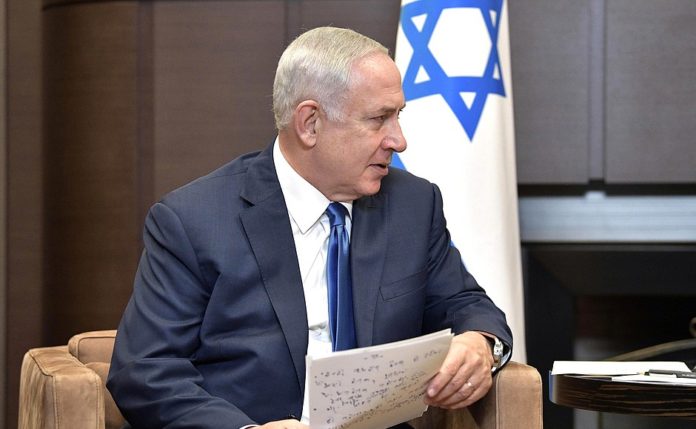
A new election will take place in Israel after Prime Minister Binyamin Netanyahu’s coalition talks collapsed last night.
The new poll is scheduled for September 17 – the first time elections have taken place twice in a year.
As the minutes ticked towards the deadline, Netanyahu made last-ditch concessions to appease Yisrael Beitenu leader Avigdor Lieberman and Chareidi parties over a IDF draft bill concerning ultra-Orthodox strudents, but his attempts failed.
So just 50 days after Israel’s leader claimed a historic fifth term in office,politicians voted to dissolve the Knesset shortly before midnight.
In a quite extraordinary day, Israelis tracked a trio of alternatives – Netanyahu forming a coalition government, the Knesset voting for a snap election or President Reuven Rivlin selecting a different party to form the government.
Rivlin explained in a video uploaded to social networks the options available to the electorate after being inundated with a plethora of inquiries.
“It is important for me to explain what the legal authority of the President is,” he noted.
Netanyahu had 28 days to form a government following his election triumph and then an additional 14 days by midnight last night.
“I have two options and I must take one of them within three days,” he explained.
“The first option is to entrust any other Knesset member, except for a Knesset member who has already had the opportunity and has not succeeded. The second option is to inform the Speaker of the Knesset that there is no possibility of forming a government and that there is no alternative but to call for elections.
“To make the decision, I will again invite the representatives of the factions for consultation. Incidentally, you should know that if I inform the Knesset Speaker that I do not believe another Knesset member could form a government, Knesset members can collect 61 signatures and request that any one of the 120 members of Knesset, including those who have already had the opportunity, be given the mandate to form a government.”
Rivlin added, “Parallel to my authority as President, the Knesset can enact a law to disperse the Knesset. If the law to disperse the Knesset passes its second and third reading with a majority of members, at least 61, the procedures for forming a government will cease. The Knesset will be dispersed, and unfortunately, we will go to another election campaign. I, for my part, will do everything in my power to prevent the State of Israel from going to another election campaign.”
It all appeared so different a few weeks ago when Netanyahu appeared to have a coalition path in place after Likud secured 35 seats on April 9.
With traditional allies, he appeared to hold a 65-55 majority.
Chareidi parties accepted a compromise regarding the draft law earlier this week. But former Defense Minister Lieberman, essential for the formation of a government, refused any compromise.
Likud in a statement said the ball was in Lieberman’s court. “If he agrees, then we will have a right-wing government formed,” they noted.
Yisrael Beiteinu responded, “The point of the plan is to make it seem like it is Lieberman’s fault for having the country go to new elections. In truth, the guilt lies with the Likud and with the person who sits at its head. After a failed attempt by the Prime Minister to form a government with positive terms, we would expect the Prime Minister to put pressure on the Chareidi parties and the Rabbis who stand behind them making the decisions. In any case, our proposal is sitting on the table. We publicised it to the masses and we have no intention of giving up on our principles.”
Netanyahu noted: “I have made my final push to try to establish a right-wing government and avoid unnecessary elections. The compromise regarding the draft law is based upon the main ideas that the IDF established and are based on the statistics that the IDF established. There is no reason to not accept this.”
Liberman took to social media 24 hour before the deadline in a Facebook post.
“Even I, who have been in Israeli politics for many years and thought I had seen everything, have been astounded over the past two days by the amount of pressure, paranoia and speculation I have been exposed to,” he wrote.
Noting his respect for Netanyahu, he continued, “I am not against the ultra-Orthodox public, I am for the State of Israel, I am for a Jewish state, but I am against a State of Halacha.”
He added that he respected the decision of voters and had no intention of demanding a rotation in the post of Prime Minister, not acting Prime Minister or even Deputy Prime Minister.”
Lieberman concluded, “We are sticking with our proposal, second and third Knesset readings for the draft law in its original version, just as was for the first reading, and that the ultra-Orthodox MKs do not participate in the vote. This is the proposal and there is no alternative.”
Knesset Speaker Yuli Edelstein duly received a letter signed by coalition heads to advance a Likud bill to dissolve the government with negotiations breaking down.
The Blue and White Party, with 35 seats, ruled out an alliance with Netanyahu. They appealed to form a coalition but a dissolution of Parliament scuppered those hopes.
By Adam Moses









